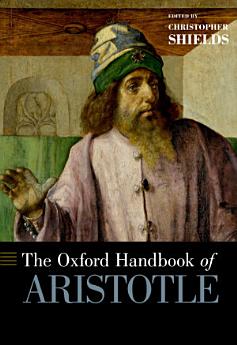The Oxford Handbook of Aristotle
Christopher Shields
មិថុនា 2012 · Oxford University Press
សៀវភៅអេឡិចត្រូនិច
744
ទំព័រ
family_home
មានសិទ្ធិ
info
reportការវាយតម្លៃ និងមតិវាយតម្លៃមិនត្រូវបានផ្ទៀងផ្ទាត់ទេ ស្វែងយល់បន្ថែម
អំពីសៀវភៅអេឡិចត្រូនិកនេះ
The Oxford Handbook of Aristotle reflects the lively international character of Aristotelian studies, drawing contributors from the United Kingdom, the United States, Germany, France, Switzerland, Italy, Canada, and Japan; it also, appropriately, includes a preponderance of authors from the University of Oxford, which has been a center of Aristotelian studies for many centuries. The volume equally reflects the broad range of activity Aristotelian studies comprise today: such activity ranges from the primarily textual and philological to the application of broadly Aristotelian themes to contemporary problems irrespective of their narrow textual fidelity. In between these extremes one finds the core of Aristotelian scholarship as it is practiced today, and as it is primarily represented in this Handbook: textual exegesis and criticism. Even within this more limited core activity, one witnesses a rich range of pursuits, with some scholars seeking primarily to understand Aristotle in his own philosophical milieu and others seeking rather to place him into direct conversation with contemporary philosophers and their present-day concerns. No one of these enterprises exhausts the field. On the contrary, one of the most welcome and enlivening features of the contemporary Aristotelian scene is precisely the cross-fertilization these mutually beneficial and complementary activities offer one another. The volume, prefaced with an introduction to Aristotle's life and works by the editor, covers the main areas of Aristotelian philosophy and intellectual enquiry: ethics, metaphysics, politics, logic, language, psychology, rhetoric, poetics, theology, physical and biological investigation, and philosophical method. It also, and distinctively, looks both backwards and forwards: two chapters recount Aristotle's treatment of earlier philosophers, who proved formative to his own orientations and methods, and another three chapters chart the long afterlife of Aristotle's philosophy, in Late Antiquity, in the Islamic World, and in the Latin West.
អំពីអ្នកនិពន្ធ
Christopher Shields is George N. Shuster Professor of Philosophy at the University of Notre Dame. He is the author of Order in Multiplicity: Homonymy in the Philosophy of Aristotle, Classical Philosophy: A Contemporary Introduction, Aristotle, Ancient Philosophy: A Contemporary Introduction, and, with Robert Pasnau, The Philosophy of Thomas Aquinas. He is the editor of The Blackwell Guide to Ancient Philosophy. Forthcoming is Aristotle's De Anima, Translated with Introduction and Notes.
វាយតម្លៃសៀវភៅអេឡិចត្រូនិកនេះ
ប្រាប់យើងអំពីការយល់ឃើញរបស់អ្នក។
អានព័ត៌មាន
ទូរសព្ទឆ្លាតវៃ និងថេប្លេត
ដំឡើងកម្មវិធី Google Play Books សម្រាប់ Android និង iPad/iPhone ។ វាធ្វើសមកាលកម្មដោយស្វ័យប្រវត្តិជាមួយគណនីរបស់អ្នក និងអនុញ្ញាតឱ្យអ្នកអានពេលមានអ៊ីនធឺណិត ឬគ្មានអ៊ីនធឺណិតនៅគ្រប់ទីកន្លែង។
កុំព្យូទ័រយួរដៃ និងកុំព្យូទ័រ
អ្នកអាចស្ដាប់សៀវភៅជាសំឡេងដែលបានទិញនៅក្នុង Google Play ដោយប្រើកម្មវិធីរុករកតាមអ៊ីនធឺណិតក្នុងកុំព្យូទ័ររបស់អ្នក។
eReaders និងឧបករណ៍ផ្សេងទៀត
ដើម្បីអាននៅលើឧបករណ៍ e-ink ដូចជាឧបករណ៍អានសៀវភៅអេឡិចត្រូនិក Kobo អ្នកនឹងត្រូវទាញយកឯកសារ ហើយផ្ទេរវាទៅឧបករណ៍របស់អ្នក។ សូមអនុវត្តតាមការណែនាំលម្អិតរបស់មជ្ឈមណ្ឌលជំនួយ ដើម្បីផ្ទេរឯកសារទៅឧបករណ៍អានសៀវភៅអេឡិចត្រូនិកដែលស្គាល់។






